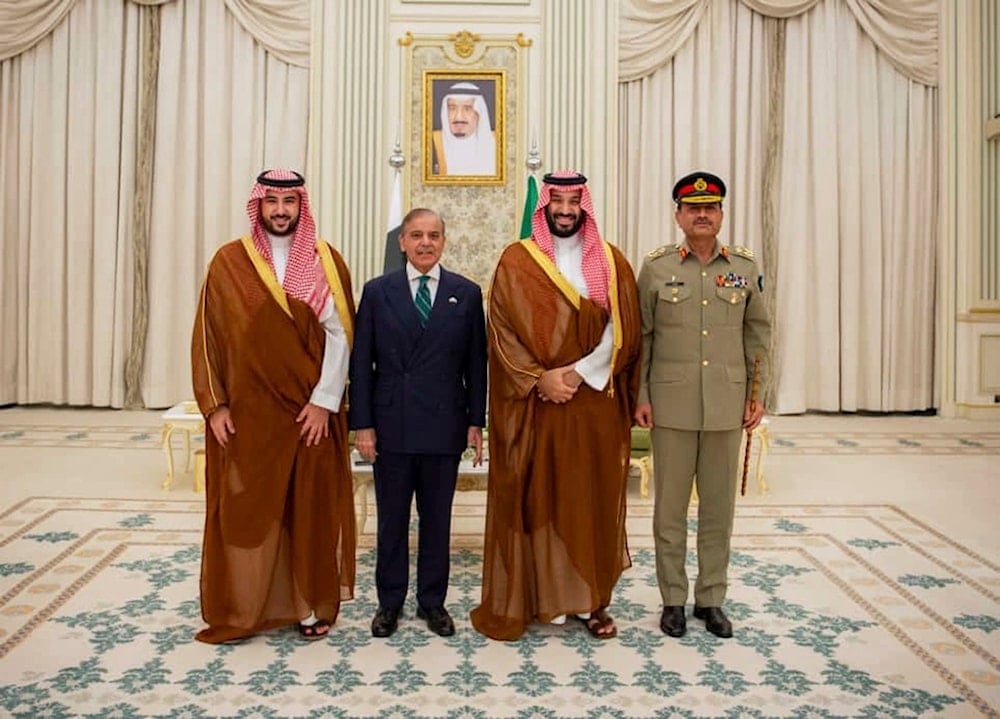Pakistan to extend nuclear umbrella in Saudi mutual defense pact
Pakistan’s Defense Minister Khawaja Asif says its nuclear deterrent will support Saudi Arabia under a new defense pact, stressing the deal is purely defensive.
-

Saudi Crown Prince Mohammed bin Salman, Saudi Defense Minister Khalid bin Salman, Pakistan's Prime Minister Shehbaz Sharif, and Pakistan's Army Chief Field Marshal Asim Munir in Riyadh, Saudi Arabia, Wednesday, September 17, 2025 (AP)
Pakistan’s Defense Minister Khawaja Asif said Thursday that the country’s military capabilities, including its nuclear deterrent, will “absolutely” be available to Saudi Arabia under a recently signed strategic mutual defense agreement, while emphasizing that the pact is “purely defensive.”
Saudi Crown Prince Mohammed bin Salman and Pakistani Prime Minister Shehbaz Sharif signed the accord on Wednesday in Riyadh, outlining a framework for enhanced defense cooperation and joint deterrence.
In an interview with Geo News, Asif described the deal as an “umbrella” arrangement: “If either country is attacked, we will respond jointly,” he said. The minister underscored that the agreement is aimed at securing peace in the region and beyond.
A joint statement after the signing stressed that “any aggression against either country shall be considered an aggression against both,” highlighting cooperation to “strengthen joint deterrence against any aggression.”
Read more: Iran, Pakistan deepen ties, cooperation for regional stability
Nuclear umbrella and scope
Asked if Saudi Arabia would benefit from Pakistan’s nuclear capabilities, Asif replied, “What we have, our capabilities, will absolutely be available under this pact.” He reiterated that Pakistan remains a responsible nuclear power since its first tests in 1998.
Asif dismissed suggestions that Washington was consulted on the agreement, noting there was “no justification to take a third party into confidence.” He added, “This is not a hegemonic arrangement but a defensive pact, while the US itself has such treaties with many countries.”
He also said it was too early to discuss whether other nations might join, but noted Pakistan’s “doors are open” and predicted global power balances would continue to shift toward China.
'Reinforcing deterrence'
A Saudi official quoted by the Financial Times said the deal reflects over a year of discussions and “is based on a two- to three-year conversation.” The official expressed hope that it would “reinforce our deterrence — aggression against one is aggression against the other.”
Saudi Defense Minister Khalid bin Salman hailed the agreement in a post on X, calling it “one front against any aggressor… always and forever.”
The new pact arrives as Riyadh grows increasingly critical of "Israel’s" war on Gaza, which has lasted nearly two years. Bin Salman has accused "Israel" of committing genocide and has ruled out the possibility of normalizing ties unless there is an end to the war and a clear path toward a Palestinian state.
Read more: Arab-Islamic summit slams Israeli strike on Qatar, urges unity
Despite the deep-rooted military relationship between the Gulf states and the US, analysts suggest that the recent Israeli aggression in Doha may accelerate efforts among Arab states to diversify their defense partnerships, particularly with countries like Pakistan.
"Israel", along with Saudi Arabia, Pakistan, and others, is a member of CENTCOM, the US military’s Central Command. It is also the only nuclear-armed entity in the Middle East, though it has never officially acknowledged its program.

 3 Min Read
3 Min Read








